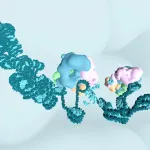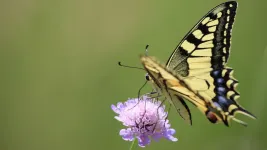(Press-News.org) Social conflicts, from policy debates to family disagreements, can easily devolve into angry words and personal attacks. Such heated confrontations, however, seldom resolve disagreements and can entrench opposing views.
A better approach to resolving interpersonal disagreements is to embrace characteristics that psychological scientists associate with wisdom, like intellectual humility, diverse viewpoints, and open-mindedness.
But applying these elements of wisdom can be difficult, especially during confrontations. The trick, according to new research published in the journal Psychological Science, is to train yourself in advance to reason about interpersonal conflicts in a wiser manner.
"People typically fail to reason wisely when facing social conflicts, so we designed an intervention to help them," said Igor Grossmann, director of the Wisdom and Culture Lab at the University of Waterloo, Canada, and the lead author on the paper. "Our fundamental idea was to train people to see situations from a more detached, third-person perspective. This approach enables people to recognize the limits to their knowledge, acknowledge different ways the conflict may play out, and consider and balance multiple viewpoints."
The researchers' intervention is based on a rhetorical device called "illeism"--the practice of referring to oneself in the third person. Rather than saying "I feel hurt and angry," a person might tell themselves, for example, "He feels hurt and angry."
According to the researchers, by switching perspective from the first to the third person, a person becomes better able to evaluate their own knowledge and appreciate alternative views.
"A third-person viewpoint, however, is not the typical default position during a conversation or interaction," said Grossmann. "We believed that through practice and training it can be possible to slowly inculcate this more wisdom-centered approach into a person's conflict-resolution techniques."
To test their hypothesis, the researchers conducted two field experiments.
In the first, participants were given an initial in-lab assessment to gauge their thoughts about a hypothetical social-conflict situation. They were then instructed to keep a month-long daily journal in which they wrote about each day's significant events. One group of participants wrote about their reflections in the first person. A second group did the same but in the third person.
At the end of the month, the participants were given a second in-lab assessment to see if the writing exercise impacted their reflections about another hypothetical social-conflict situation. The results revealed that the third-person writing group had developed a more wisdom-centric approach to how they thought about conflict. The first-person writing group showed much less change.
The second experiment involved a similar one-week writing assignment and evaluation, but it added a third group of participants who were given no instruction on how to write about their experiences. The results of the second experiment supported the conclusions of the first.
"Our research demonstrated effectiveness of the illeist diary writing for a change in wisdom compared to first-person and no-instruction diary reflections," said Grossmann. "After the intervention, distanced self-reflection led to incremental shifts in wise reasoning about personally challenging interactions."
The data suggest that this increase in wise reasoning occurred in part because distanced self-reflection broadened people's typically narrow self-focus. This research provides the first empirical evidence for the trainability of wisdom in daily life when working through challenging interactions.
INFORMATION:
Psychological Science, the flagship journal of APS, is the leading peer-reviewed journal publishing empirical research spanning the entire spectrum of the science of psychology. For a copy of this article and access to other research in Psychological Science, contact news@psychologicalscience.org.
Reference: Grossmann, I., Dorfman, A., Oakes, H., Santos, H., Vohs, K., & Scholer, A. (2021). Training for wisdom: The distanced-self-reflection diary method. Psychological Science. Advance online publication.
https://doi.org/10.1177/0956797620969170
The global problem of unowned domestic cats, driven by the cats' phenomenal reproductive success, carries significant economic, animal welfare and biodiversity costs. Big-data research led by an expert on veterinary medicine and infectious diseases at City University of Hong Kong (CityU) has found that although more than 80% of cats in Australia were desexed, only a fraction have had surgery before reaching puberty, thus creating a "pregnancy gap". To close this gap and prevent unwanted litters, it is recommended that the age of desexing is before four months.
The research was led by Professor ...
OAK BROOK, Ill. - Breast cancer death rates have stopped declining for women in the U.S. younger than age 40, ending a trend that existed from 1987 to 2010, according to a new study in Radiology. Researchers expressed hope that the findings would raise awareness of breast cancer in younger women and spur research into the causes behind the change.
Breast cancer is the most common non-skin cancer and the second most common cause of cancer deaths in women in the U.S., accounting for 30% of all cancers in women. Although most invasive breast cancers occur in women age 40 years and older, ...
Scientific and public health experts have been raising the alarm for decades, imploring public officials to prepare for the inevitability of a viral pandemic. Infectious epidemics seemingly as benign as "the flu" and as deadly as the Ebola virus provided ample warning, yet government officials seemed caught off guard and ill prepared for dealing with COVID-19. Three future-oriented researchers and policy experts map out an "Epidemiological Blueprint for Understanding the Dynamics of a Pandemic."
COVID Detectives
Researchers around the world have become forensic, Sherlock Holmes-like "consulting detectives" for government officials and public health organizations. Handling tens of thousands ...
In the span of only 15 years, a small academic elite has increased its share of academic citations significantly. In the year 2000, 14 per cent of all citations went to the top one percent of the most cited researchers. New research shows that this figure had risen to 21 per cent in 2015.
The people behind these remarkable findings are senior researcher Jens Peter Andersen, Danish Centre for Studies in Research and Research Policy (CFA) at Aarhus BSS, Aarhus University, and associate professor Mathias Wullum Nielsen (former CFA, now University of Copenhagen). Their examination of almost 26 million scientific papers and four million authors has just been published in the well-established interdisciplinary journal Proceedings of the National Academy of Sciences ...
Animal owners frequently report concerns and worries relating to caring for their animal during the pandemic, new research suggests.
The study, by the University of York, also revealed owners had increased their appreciation of their animals during the first lockdown phase. The notion that people "could not live without" their animals and that they were a "godsend" or a "lifeline" in the pandemic was frequently expressed.
The study has been investigating the role of animals as sources of emotional and physical support during the pandemic. More than 40 per cent of UK households are estimated to own at least one animal.
There was consensus among participants that companion animals constituted a reliable source of support, providing unconditional love, ...
When human cells have to adapt due to a wide variety of external influences, the BAF complex plays a central role because it controls the accessibility of the DNA and thus the information stored in it. In every fifth human cancer, a mutation is found in one of the BAF complex genes. Scientists from the research group of Principal Investigator Stefan Kubicek at the CeMM Research Center for Molecular Medicine of the Austrian Academy of Sciences have investigated this complex in more detail using novel techniques and were able to show how quickly changes in the BAF complex genes influence the accessibility of DNA. The study has now been published in Nature Genetics.
Chromatin is a central component of the cell nucleus and refers to the material that ...
In nature, as in everyday life, we are surrounded by resonance - the phenomenon that describes how each object has a frequency that it prefers to vibrate at. The note of a guitar string and the sound of Big Ben chiming are examples of resonance.
Vibrations near resonance cause strong impacts. Bridges collapse if soldiers march in unison; a kid can 'push' themselves on a swing by moving their legs at the correct rate, and two pendulum clocks on the same table will synchronise. These examples show the enhanced sensitivity given to an object when it is provided with energy at a specific (that is, resonant) frequency. It's no wonder then that physicists and engineers are always looking for ways to use ...
Causal reasoning is ubiquitous - from physics to medicine, economics and social sciences, as well as in everyday life. Whenever we press the button, the bell rings, and we think that the pressing of the button causes the bell to ring. Normally, causal influence is assumed to only go one way - from cause to effect - and never back from the effect to the cause: the ringing of the bell does not cause the pressing of the button that triggered it. Now researchers from the University of Oxford and the Université libre de Bruxelles have developed a theory of causality in quantum theory, according to which cause-effect relations can sometimes form cycles. This theory offers a novel understanding of exotic processes in which events do not have a definite causal ...
"86 percent of the respondents rate the home office regulation as appropriate," says BfR-President Professor Dr. Dr. Andreas Hensel. "This illustrates that people also accept changes in their everyday occupational life in order to contain the coronavirus."
https://www.bfr.bund.de/cm/349/210119-bfr-corona-monitor-en.pdf
Day-care centres and schools are still closed except for emergency care. However, this measure is judged as appropriate by a decreasing number of respondents: Since the beginning of the year, approval has dropped by 10 percentage points from 67 percent to now 57 percent. A similar development can be seen in the acceptance of the closure ...
Understanding the interaction of organisms in the evolution of species is an important topic in ecology. Insects and plants, for example, are two large groups on earth that are linked by a variety of interactions. Since the mid-20th century, theories linking this diversity and specific interactions have proliferated.
The development of new technologies and new methods has made it possible to study the interaction between plants and insects in greater detail and to reveal the impact of these interactions on their respective evolution. In a new study, an international team of researchers, including botanist Prof. Stefan Wanke of TU Dresden, has established the link between ecological changes, ...






